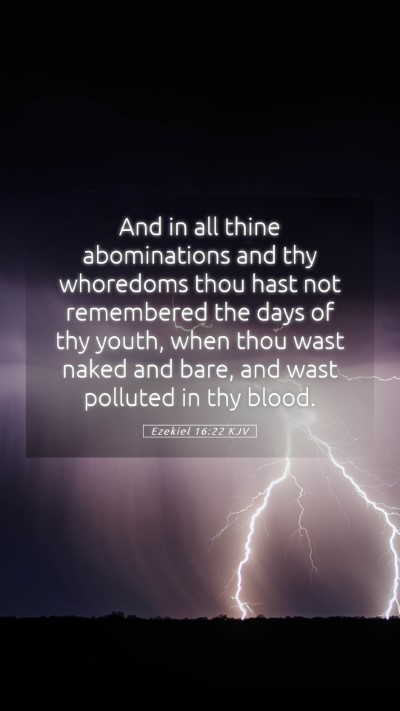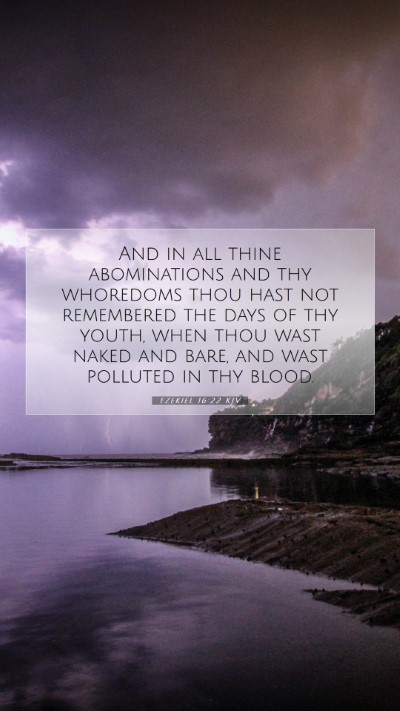Ezekiel 16:22 - Understanding the Verse
Ezekiel 16:22 states, "And in all thine abominations and thy whoredoms thou hast not remembered the days of thy youth, when thou wast naked and wast polluted in thy blood." This verse draws attention to the ungratefulness and the moral decline of Jerusalem, as depicted through the metaphorical language used by the prophet Ezekiel.
Commentary Insights
Insights from prominent public domain commentators, including Matthew Henry, Albert Barnes, and Adam Clarke, reveal several layers of meaning within this verse:
-
Matthew Henry's Commentary:
Henry emphasizes the ingratitude reflected in Israel's actions. He asserts that the people had forgotten their humble beginnings and the mercies of God during their formative years. Their past need and the grace shown to them stand in stark contrast to their current spiritual infidelity represented as 'whoredoms'. This indicates a shift from reliance on God to the pursuit of idolatrous practices.
-
Albert Barnes' Commentary:
Barnes reflects on the implications of 'abominations' and 'whoredoms'. He interprets these as not only a metaphor for disobedience to God but also as a serious affront to their covenant relationship with Him. By forgetting the days of their youth when they were in need, the people show blatant disregard for the transformative power of God's grace in their lives.
-
Adam Clarke's Commentary:
Clarke provides a detailed historical perspective, suggesting that this verse serves to remind the Israelites of their past vulnerability and subsequent elevation through God's love and protection. He points out that forgetting this divine journey leads to a form of 'pollution,' both spiritually and socially, which jeopardizes their standing with God.
Key Themes and Concepts
This verse encapsulates several vital themes for Bible study insights and understanding Scripture:
- Memory and Gratitude: The importance of remembering one's past, particularly the mercy and grace of God, is central to the message of this verse.
- Spiritual Infidelity: The term 'whoredoms' signifies a break in covenant loyalty, pointing to the consequences of straying from God's commandments.
- The Cycle of Abomination: The pattern of sin, forgetting God’s past mercies, leads to greater abominations, suggesting a progressive degradation in spiritual standing.
Application and Relevance
Understanding Ezekiel 16:22 has significant implications for modern believers, particularly in the context of how to interpret Bible verses in personal and communal settings:
- Self-Reflection: Believers are encouraged to reflect on their relationship with God and consider how they remember or forget His works in their lives.
- Community Accountability: Just as God rebuked Israel, there is a call within the church today to hold one another accountable to live out their faith authentically.
- Pursuit of Holiness: The stark reminder of past 'pollution' serves as a call to pursue a life that honors God in each aspect, avoiding the temptations of idolatry in modern forms.
Cross References
This verse relates closely to other sections of Scripture that emphasize similar themes:
- Ezekiel 23:36-39: Further discusses Israel’s infidelity through the metaphor of two sisters, Samaria and Jerusalem.
- Isaiah 51:1: Urges the people to look back to their origin and the rock from which they were hewn, invoking a similar theme of remembrance.
- Romans 12:2: Calls believers to renew their minds and not conform to the patterns of this world, emphasizing a consistent pursuit of God’s ways versus the world’s allure.
Concluding Thoughts
The study of Ezekiel 16:22, true to its richness in meaning, calls for thorough exploration via Bible study tools and Bible study guides. The ongoing search for Bible verse meanings encourages believers to deepen their understanding Scripture, fostering a stronger relationship with God through diligent and reflective Bible study lessons.


